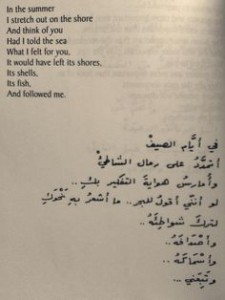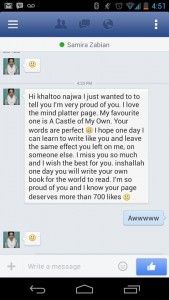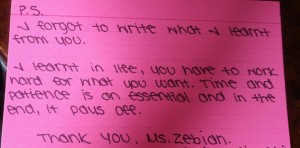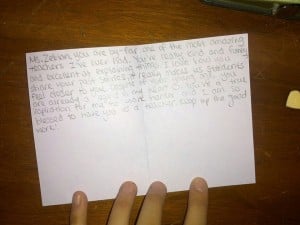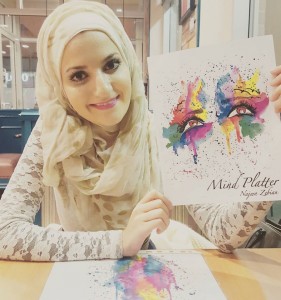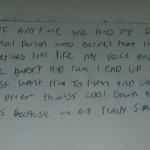Where do I begin with answering this question? I am still discovering myself so I hope, as I try to answer that question, that I can reveal some of myself to myself and to you.
Our histories, you see, shape us to be who we are today. They mold us into the beings whose hearts and minds are what they are today. My journey with expression began many years ago. Yes, expression, not writing. Writing has not always been the highlight of my life. As the youngest of six in my family, by many years, I enjoyed always being surrounded by adults, waiting to follow in their footsteps. I was always amazed at the world that I saw through their eyes. It might sound like a scene from a movie, but believe me when I tell you that what I remember most from my childhood was this:
Sitting with my grandma and listening to her stories on our balcony in our village in Lebanon. Half of the time, we had no power, so the stars were really our light, and the mountainous breeze is one I can still feel so vividly as I reflect back on those days. Most of her stories, except the few about her own children, were about morals in life. She was illiterate so her wealth of knowledge could only be transferred through speaking. The wisdom that she carried was packed with deep meanings and reflections on life.
I remember listening very attentively and asking questions. Our house was meters away from the mosque, and five times a day, we’d listen to a short recitation of Quranic verses before the call for prayer. And I asked questions about the meanings of verses, both to my dad and my grandma. They always answered me. In fact, my dad actively reminded me to never do a thing without understanding why I was doing it. He actively reminded me to never follow anyone or anything blindly, even in religion. And if you don’t know, the Quran uses very poetic Arabic. It is packed with deep meanings rooted in moral values. And reflecting back on that, I know that decoding for meanings continues to shape my way of seeing life and everything around me.
Being there to answer my questions was especially important to my dad after the sixth grade, since I started attending a private Islamic school. He agreed to send me there because I wanted to go there and because the school had high academic standards, but he always kept the door open for me to ask him questions about things I learned. That is one thing that I will always admire about my dad. He never curbed my curiosity. He encouraged it.
It was that year, the seventh grade, that I started getting emotionally bullied by my peers, but at the time, I didn’t even know what “bullying” was. I internalized and believed everything that was said to me, and because I was so ashamed of it, I never spoke about it. Still, at this point, writing was not a way for me to express myself. Drawing was. Listening to music was. Silence was my way of expression. And this continued until the tenth grade, when I got my first journal from Mariam, my best friend. The first time I wrote in it, I struggled to fully express myself, but as the days went by, I found myself gravitating towards its pages, because it was the only place I could write about my feelings.
My dad always read poetry and listened to old soul-nourishing music both in its rhythm and lyrics. Fairuz, Abdelhalim Hafez, Um Kulthoum were a staple in every car drive. Not the new “empty” music. My dad’s in-house library was filled with books by writers from every walk of life. I always gravitated towards Nizar Qabbani and Khalil Gibran. Their words felt like home to me.
My family was always in constant motion between Lebanon and Canada. By ninth grade, all of my siblings were here. My mom was here for more than half the year, and I stayed with my dad and grandma. At different points, I lived with two of my uncles, two of my aunts, my cousin and my sister. This exaggerated within me the need to be silent so that I wouldn’t burden anyone around me with my worries. As my bullying got worse, even from teachers, writing became more of a daily must for me. My journal was my shoulder to cry on. It was my friend and my loyal listener.
In the summer of 2006, at sixteen, I came to Canada for a visit in the summer, and when the war broke out in Lebanon, I was forced to stay here. And for anyone who hasn’t gone through the experience of being forced to stay out of your home, you might not understand how silencing that feels. I didn’t get a chance to say a real goodbye to my home, my room, my grandparents, my friends and all of the places that I knew. For a whole year here, I felt invisible. I felt betrayed, and I don’t even know by whom. By life? By war? I don’t know. For a whole year, I did not write even a sentence to express myself in my journal. In fact, when I became certain that I was “stuck” in Canada, I was so angry with myself, that I ripped up every single page of my journal that I had been writing in for the past three years. What was the point of expressing myself if no one heard it? What was the point of taking hours to write my feelings down if I was not able to do anything to change my reality?
I was done with writing. I was done with feeling.
Grade 12 passed.
First year of university passed.
Second year.
Third year.
Fourth year.
Teacher’s college.
And my immunity to express myself was stronger than ever, because when I did, I was “too sensitive” or “too deep”.
Master’s in Education. This is when I started rekindling the fire of writing. As I learned about ways in which our students learn new languages and new ways of expression, my love for the power of words had me writing every single day. I started writing about education. This was my first post.
On April 27, 2013, I wrote: “Our students are thirsty to learn, thirsty to be given space for thinking, criticizing, and being heard. We need to be like pouring rain over them, sending the rain of inspiration to make a difference in the world, freedom to speak for themselves and those who don’t have a voice, and power to realize that the only thing in the way of them reaching their goals is them. We need to nourish their need to ask questions. Education is about them and for them, and so it should be.”
When I felt the urge to write on behalf of my students, it was okay to write. I wasn’t writing about myself, but about them.
Many more posts about education followed.
But writing, you see, is not something that you can always take control over. Sometimes it leads you. And that’s what it did for me. It led me. It drove me back into writing about feelings, but this time I wasn’t talking about my day-to-day encounters. I wasn’t talking about specifics of my day. I was talking about the experiences that my students went through, addressing how they should deal with their feelings. And looking back, it’s amazing to see how much louder your voice becomes when you are speaking on behalf of someone who needs a voice.
I wrote about the importance of being true to yourself, forgiveness, contentment, goodness, inner strength, motivation, compassion, love and empowerment, to name a few.
I did not realize how powerful my voice could be until I saw the difference that it made for the students that I read my words to. And the more it empowered them, the more it encouraged me to write. The more I wrote, the more I discovered myself as a person. And pieces of my soul started seeping into my words. Before I knew it, I was writing about my own feelings. The courage I saw within students to admit their feelings so authentically made me crave that for myself. We often forget that we were once who our kids were, and that our worlds are only as different and separate as we allow them to be.
Three years later, what began as an honest expression of the way that I viewed the world through my eyes and the eyes of those around me, turned into a book that contains every one of those experiences. Every triumph and every failure. Every strength and every weakness. Every disappointment, heartbreak and fall. Two hundred and eleven pages of expression, bridging my experiences with those that I saw my students and those around me go through.
Mind Platter: all that is on my mind served on a silver platter.

Click here to purchase your copy of Mind Platter.
It was never my intention to write in order to get published. But if my words have the power to inspire students to write, as they have, then they, my students, must be worthy of being exposed to them. So, here is my plan:
This book will be published with the sole purpose of nourishing the love of reading and writing for anyone who reads it. It will be free of charge for students and anyone else who wishes to read it. There is one twist, though. Whatever students are able to pay will go as a donation to the Syrian refugees arriving in Canada. I am currently working with my school board to arrange a book launch event, and once the dates are set, I will make that public.
But this is not the happy ending. This is the beginning of a great responsibility. I cannot encourage students to express themselves and think outside the box if I don’t do that myself. I cannot convince them to believe in themselves, to allow themselves to fall, to take risks and make mistakes, unless I allow them to see that I do those things too. As I am pursuing my Doctorate studies in Educational Leadership, I am learning that we lead by being present, by showing that we are humans too, and by finding shelter in the simplicity and humility of our core human values.
If my words inspire one person to see him or herself differently, I am content. All the money in the world cannot provide me with the joy of that spark that I see in someone’s eyes because they see the world a little differently.
Mind Platter is not about the words that are in it, but about what the reader makes of them. Mind Platter does not only belong to me. It belongs to everyone whose path crossed mine. Had my journey not have been what it was, with every story and every detail, I would not be the same person today. May this book give a voice to those who need one, be a crying shoulder for those who need someone to listen, and inspire those who need a reminder of the power that they have over their lives.
– Najwa
Click here to purchase your copy of Mind Platter.

